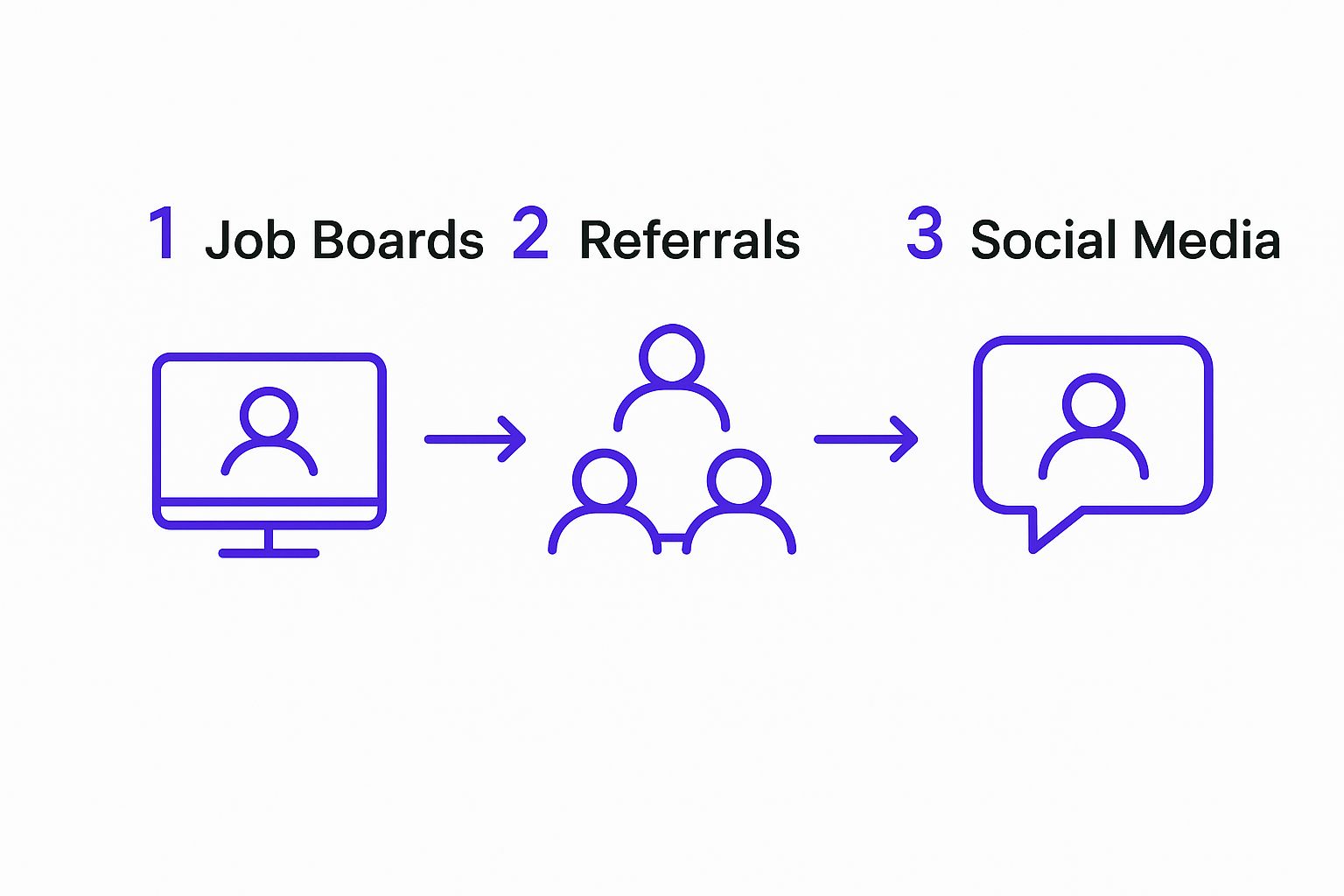Before you even think about posting a job ad, the real key to hiring a great customer service representative is to build a blueprint of your ideal candidate first. This means getting crystal clear on their daily tasks, the soft skills that actually matter, and what success looks like from day one. When you take the time to do this foundational work, you naturally attract and identify people who will truly thrive.
Building Your Foundation for a Great Hire
So, where do you start? The most critical first step is defining what a successful CSR looks like inside your home service business. If you have a fuzzy idea of the role, you'll get generic hires who can't handle the pressure or don't have the specific skills to succeed in this fast-paced environment.
This planning is more important than you might think. While the total number of CSR jobs is expected to dip slightly, the U.S. Bureau of Labor Statistics still projects about 365,300 openings each year on average. Most of that is due to turnover. This means your hiring process has to be sharp enough to grab the best people from a constantly churning pool of candidates.
What Does the Job Really Involve?
Let's get specific. "Answering phones" isn't a job description. Think through the actual scenarios your team deals with every single day. For a home service CSR, a typical day is a whirlwind of:
- Scheduling & Dispatch: A master-level game of Tetris, juggling technician schedules, planning efficient routes, and letting anxious customers know when to expect their pro.
- Handling Upset Customers: Talking someone off a ledge when a technician is late, a repair didn't stick, or a bill is confusing. This requires serious de-escalation skills.
- Coordinating with Techs: Acting as the central hub, passing on critical job details, updating work orders on the fly, and making sure everyone is on the same page.
- Managing Follow-ups: Calling customers after a job to ensure they're happy, locking in future maintenance appointments, and maybe even generating a positive review.
What Skills and Traits Can't Be Taught?
You can teach anyone how to use your CRM or phone system. What you can't easily teach are the soft skills that separate a good CSR from a great one. For home service businesses, two things stand out above all else: genuine empathy and quick-thinking problem-solving.
A fantastic CSR doesn’t just read from a script. They actively listen, connect with a customer’s frustration, and then find a smart solution that keeps the customer happy while also protecting the business.
When you're screening candidates, you need a clear checklist of these core attributes. Think of it as a scorecard for identifying top-tier talent.
Key Attributes of a High-Performing CSR
| Attribute Type | Essential Skill/Trait | Why It Matters for Home Services |
|---|---|---|
| Communication | Active Listening | Must understand the customer's real problem, not just the words they're saying, to find the right solution. |
| Emotional Intelligence | Empathy & Patience | Home service issues are stressful. CSRs must calmly handle frustrated, sometimes angry, customers without taking it personally. |
| Problem-Solving | Resourcefulness | When a technician is stuck in traffic or a part is unavailable, the CSR needs to think on their feet to find a new plan. |
| Mindset | Resilience | CSRs hear "no" and deal with complaints all day. They need the mental toughness to bounce back from tough calls. |
| Organizational | Attention to Detail | A wrong address or incorrect job notes can derail a technician's entire day and ruin a customer's experience. |
Looking for these specific traits from the very beginning helps you filter out candidates who only look good on paper and focus on those who have the right stuff to succeed.
The best CSRs are your brand ambassadors. They get that every single call—from a simple schedule request to a heated complaint—is a chance to build on the trust and reliability your company is known for.
By creating this blueprint upfront, you're not just getting ready to fill a position. You're setting a standard of excellence for your entire customer service operation. To really fine-tune your entire hiring funnel, it’s worth digging into proven strategies to improve the recruitment process.
How to Write Job Posts That Attract the Best

Your job post is your first handshake with a potential hire. Let’s be honest, a generic, corporate-sounding description packed with clichés is a surefire way to attract uninspired candidates who are just blasting their resumes out to anyone and everyone. If you want to find the best people, you need to sell the role, not just list its duties.
Think of it less as a "job description" and more of a "career advertisement." This isn't just about finding someone to answer phones. When you consider that a staggering 86% of customers will walk away after a bad experience, you realize you're hiring a brand protector. Your job post needs to reflect the weight of that mission.
Frame the Role with Purpose
Instead of opening with a dry, bulleted list of responsibilities, lead with what makes the job meaningful. For a home service business, this means framing the challenges and rewards in a way that clicks with natural-born problem-solvers.
- Don't say this: "Responsibilities include answering phones, scheduling appointments, and data entry."
- Try this instead: "You will be the calm, organized center of our daily operations. You'll turn scheduling chaos into a smooth-running machine for our technicians and make sure homeowners feel cared for and confident from their very first call."
See the difference? That small shift in language changes the entire feel of the role. It elevates the position from a set of tedious tasks to a role with real impact. You're not just filling a seat; you're looking for a partner in your company’s success. For more tips on this, our free guide on hiring a virtual assistant has a great checklist you can adapt for your job posts.
Be Brutally Honest About the Challenges
Top performers aren't scared of a challenge; in fact, they appreciate honesty. Don't try to sugarcoat the tough parts of the job. Being upfront about the realities is a core part of a strong hiring strategy.
"You'll be the first point of contact for homeowners who might be having a really bad day. Your job is to be the reassuring voice that turns their frustration into relief."
A statement like that does two things perfectly. First, it weeds out candidates who can't handle pressure. Second, it attracts those who thrive on making a tangible difference for people. It shows you respect them enough to be transparent from the get-go.
Finally, post your ad where the right people will actually see it. Big job boards like Indeed are a decent starting point, but don't stop there. Think about local community forums or industry-specific groups on Facebook or LinkedIn. This targeted approach gets your carefully crafted message in front of professionals who already get the home service world.
How To Design an Interview That Uncovers Top-Tier Talent

A résumé tells you what someone has done, but a sharp interview process shows you who they are. It reveals how they think on their feet, especially when things get messy. For successful customer service representative hiring, you have to ditch the generic questions and dig deeper to find genuine talent, not just people who memorized the "right" answers.
I always recommend starting with a quick phone screen. Think of it as a first filter. You’re not trying to learn their life story here; you just want to confirm their core communication skills and that they meet the basic job requirements. A 15-minute chat is usually all it takes to get a feel for their professionalism and interest, which saves a ton of time for both you and the applicant.
Move Past “Tell Me About Yourself”
The real insights come from putting candidates into realistic, scenario-based challenges. This is where you test their problem-solving skills in situations your CSRs will actually face every day. You're looking for a mix of empathy, resourcefulness, and the ability to stay cool under pressure.
Try throwing them a curveball with questions like these:
- Scenario 1: “A technician is stuck in traffic and will be an hour late for his next appointment. The customer is already upset because this is the second time they've had to reschedule. Walk me through exactly what you would do.”
- Scenario 2: “A customer calls, furious that the repair our technician did yesterday has already failed. They’re demanding we send someone out immediately, but every single tech is booked solid for the next two days. How do you handle that call?”
Their answers here are worth a hundred times more than "What's your biggest weakness?" You get a direct look at their thought process, how they de-escalate conflict, and whether their instinct is to solve the problem or just pass the buck.
A candidate's reaction to a hypothetical stressful situation is the closest you'll get to seeing them in action before they're on your payroll. Look for those who lean into the problem with a helpful attitude.
Looking for Empathy and the Right Vibe
Beyond just solving problems, you need to find out if they have genuine empathy. A great way to do this is to ask them to describe a time they turned an angry customer into a happy one. Pay close attention to their language. Do they talk about "following company policy," or do they focus on understanding and easing the customer's frustration?
The demand for great reps is high, especially in our line of work. Expert surveys show that home services—along with tech and healthcare—are major hotspots for customer service job growth. Knowing these industry hiring forecasts can give you an edge in a competitive hiring market.
Ultimately, remember the interview is a two-way street. It's your best shot at seeing if they’re a fit for your team, but it's also their chance to decide if your company is the right place for them. When you design a process that mirrors the reality of the job, you’re much more likely to find someone who will truly thrive. This approach works well for all kinds of support staff—we touch on similar ideas in our guide on how to hire a virtual assistant for internet marketing.
Onboarding New CSRs for Long-Term Success
Getting the right person in the door is a huge win, but let's be honest—that's when the real work begins. A structured, supportive onboarding experience is what turns a promising new hire into a confident, long-term team member. I've seen it time and again: when training is rushed or chaotic, it leads directly to high turnover and unhappy customers.
A great onboarding plan isn't about throwing someone into the deep end and hoping they can swim. It's about systematically building their confidence and competence. In fact, companies with a strong onboarding process boost new hire retention by an incredible 82%. To get your new CSRs integrated smoothly and contributing quickly, a solid new hire onboarding process is absolutely essential for their success and yours.
From Training Manual to Real-World Practice
That first week should be a carefully planned blend of foundational knowledge and practical, hands-on experience. Start with a detailed training manual, but don't just make it a list of rules. Think of it as a playbook for success.
It should cover:
- Your Company Culture and Values: What does it truly mean to be the voice of your brand?
- Core Systems: Deep, hands-on training with your CRM and phone systems. Don't just show them; have them perform tasks themselves.
- The Top 10-15 Scenarios: Outline the most frequent customer issues and your standard procedures for handling them.
- The Technician Roster: Who are the techs? What are their specialties or territories? This personal knowledge helps build crucial internal rapport.
Once they've got the basics down, move directly into shadowing. Have the new CSR listen in on calls with a seasoned team member for at least a full day. This gives them invaluable context, showing how textbook procedures are applied in real, unscripted conversations.
It's also helpful to remember where your candidates came from, as each channel might require a slightly different onboarding emphasis.

Whether they came from a formal job board or an internal referral, each new hire brings a unique level of familiarity with your business from day one.
Building Confidence With Role-Playing and a 90-Day Plan
Shadowing is passive; role-playing is where the learning gets active. This is how a new hire builds genuine confidence before ever taking a live call. Create scenarios based on your toughest customer interactions.
For example: "A customer is furious because a plumbing repair you scheduled for today has failed, and their basement is flooding again. What do you do?"
Work through these tough situations until the new CSR can handle them calmly and effectively. This practice is the bridge between training and performance.
Key Takeaway: A well-structured 30-60-90 day plan gives new hires a clear roadmap. It breaks down the overwhelming first few months into manageable milestones with specific goals and dedicated feedback loops.
Here’s a simple framework to follow:
- First 30 Days (Learning): The goal here is getting comfortable with your systems and policies. By the end of this period, the CSR should be able to handle basic calls with minimal supervision.
- Next 30 Days (Contributing): Now the focus shifts to efficiency and proactive problem-solving. Your new hire should be hitting call volume targets and needing less support from senior staff.
- Final 30 Days (Mastering): At this point, the CSR should be fully autonomous. They should show a deep understanding of complex issues and be a true contributor to the team's goals.
This structured approach to customer service representative hiring and training sets clear expectations, provides consistent support, and builds the foundation for a fantastic, long-term employee.
Keeping Your Best People and Slashing Turnover

You’ve gone through the whole hiring process and found a fantastic customer service representative. That’s a huge win, but the work doesn’t stop there. Now, you’ve got to keep them. High turnover isn't just an annoyance; it’s a silent killer of your budget, your time, and your team's spirit.
The cost of losing good people—and the poor service that often follows—is genuinely staggering. While you hear a lot about AI, the reality is that only about 25% of call centers have deeply integrated it. This means real, human conversations are still the heart of your business. When those interactions go south, U.S. companies lose an estimated $75 billion annually.
Think about it this way: replacing just one single agent can set you back around $10,000. Suddenly, focusing on retention isn't just a "nice-to-have," it's a core business strategy.
Pay Competitively and Show Them a Path Forward
Let's get the most obvious thing out of the way first. You have to pay people what they're worth. If your pay isn't in line with what other home service businesses in your area are offering, you're setting yourself up for a revolving door of employees. Do your homework, see what the local market rate is, and aim to be right there or even a little above, especially for reps who can handle the complexities of dispatching.
But pay is just the beginning. Good people want to grow. If they feel like they’ve hit a ceiling, they’ll start looking for a ladder elsewhere. You need to show them a real future with your company.
- Build a Career Path: Clearly map out what it looks like to move from a junior CSR to a senior position, a team lead, or maybe even the person who trains new hires.
- Invest in Their Skills: Offer to pay for a relevant online course or send them to a customer service workshop. It shows you're invested in their development.
- Promote From Your Ranks: When a more senior role opens up, always look to your existing team first. Nothing motivates people more than seeing one of their own succeed.
Lead with Support and Empathy
People don't quit jobs; they quit bosses. It’s a cliché for a reason. Your leadership style has a direct line to employee loyalty. In fact, a whopping 76% of employees say they feel more engaged and motivated when their leaders are genuinely empathetic.
A supportive manager doesn't just hand out tasks—they coach their people. They give regular, helpful feedback. They celebrate wins in front of everyone and handle problems privately, focusing on finding a solution instead of placing blame.
This kind of environment makes your team feel like valued partners, not just cogs in a machine. When they feel the company is invested in their success, they become far more invested in the company's. For a deeper dive, there are some great effective employee retention strategies that expand on this.
Recognize, Appreciate, and Trust Your Team
Finally, don't ever underestimate the power of a simple "thank you." Acknowledging someone for handling a tough customer call with grace or giving a company-wide shoutout for a glowing review can make all the difference.
When you invest in fair pay, provide clear opportunities for growth, and build a culture of supportive leadership, you create a team that's built to last. These same principles apply if you're thinking about other remote roles, too—our guide on https://phonestaffer.com/how-do-you-hire-virtual-assistants/ touches on similar ideas. At the end of the day, keeping your best CSRs means they’ll deliver the kind of service that turns first-time callers into loyal customers.
Frequently Asked Auestions About CSR Hiring
When you're trying to hire the right customer service rep, a lot of questions come up. It's a competitive market out there, and getting the details right can feel like walking a tightrope. Let's tackle some of the most common questions I hear from home service business owners.
Think of this as your field guide to making smarter hiring decisions. This isn't just about filling an empty chair; it’s about finding a person who will become the voice of your company and a cornerstone of your daily operations.
What’s a Fair Salary for a CSR in This Industry?
Let's talk money. Pinpointing the "right" number depends on a few things: where your business is located, how much experience your ideal candidate has, and the specific pressures of a home service job.
The U.S. Bureau of Labor Statistics gives a ballpark median figure of around $20.59 per hour, but you should take that with a grain of salt. It's just a starting point. For real-world numbers, you need to dig into what companies in your city are paying. Jump on sites like Glassdoor or Indeed and see what the going rate is for similar roles.
My Two Cents: In the home service world, I always suggest offering a little bit more than the local average. Why? Because you're not just hiring a call-taker. You're hiring someone to manage chaotic schedules, dispatch technicians, and calm down a homeowner with a burst pipe. That extra dollar or two an hour attracts people who already get it, which saves you a ton of headaches.
And remember, your offer is more than just an hourly wage. A solid benefits package—think health insurance, paid time off, and maybe even performance bonuses—can easily make your offer stand out from the crowd.
What Are the "Must-Have" Skills for a Home Service CSR?
Sure, they need to know their way around a computer. That’s a given. But for a CSR to truly thrive in the fast-paced, often chaotic world of home services, they need a specific set of skills that go way beyond basic phone etiquette.
These are the non-negotiables:
- Quick-Thinking Problem Solving: What happens when a technician is stuck in a three-car pile-up and their next customer is blowing up the phone? Your CSR needs to be able to think on their feet, find a solution, and keep everyone calm.
- Real, Honest Empathy: Home service issues are personal and stressful. A great CSR doesn’t just read from a script; they genuinely connect with the customer's frustration before trying to solve the problem. It’s about making them feel heard.
- Jedi-Level Organization: Your CSR is the air traffic controller for your entire operation. They’re juggling complex schedules, trying to optimize routes, and making sure every single follow-up call happens. This demands serious attention to detail.
How Do I Stop the Revolving Door of CSR Turnover?
High turnover is exhausting and expensive. The cycle usually starts with a weak hiring process, but it’s kept alive by a poor work environment. If you want great people to stick around, you have to give them a reason to.
It starts with great training, but it can't end there. You need to provide ongoing development and show them a clear path for growth within your company. If they can see a future with you, they're more likely to stay. Competitive pay and benefits are the foundation of this.
But honestly, the biggest factor is culture. Create a place where people feel appreciated. Train your managers to lead with empathy, not just authority. Give regular, helpful feedback. When people feel supported and valued, they don't go looking for another job.
Tired of the endless cycle of hiring, training, and managing CSRs yourself?
Let Phone Staffer take it completely off your plate. We find, train, and place top-tier, remote customer service representatives who are ready to work in your home service business from day one. Learn more and get your time back.

